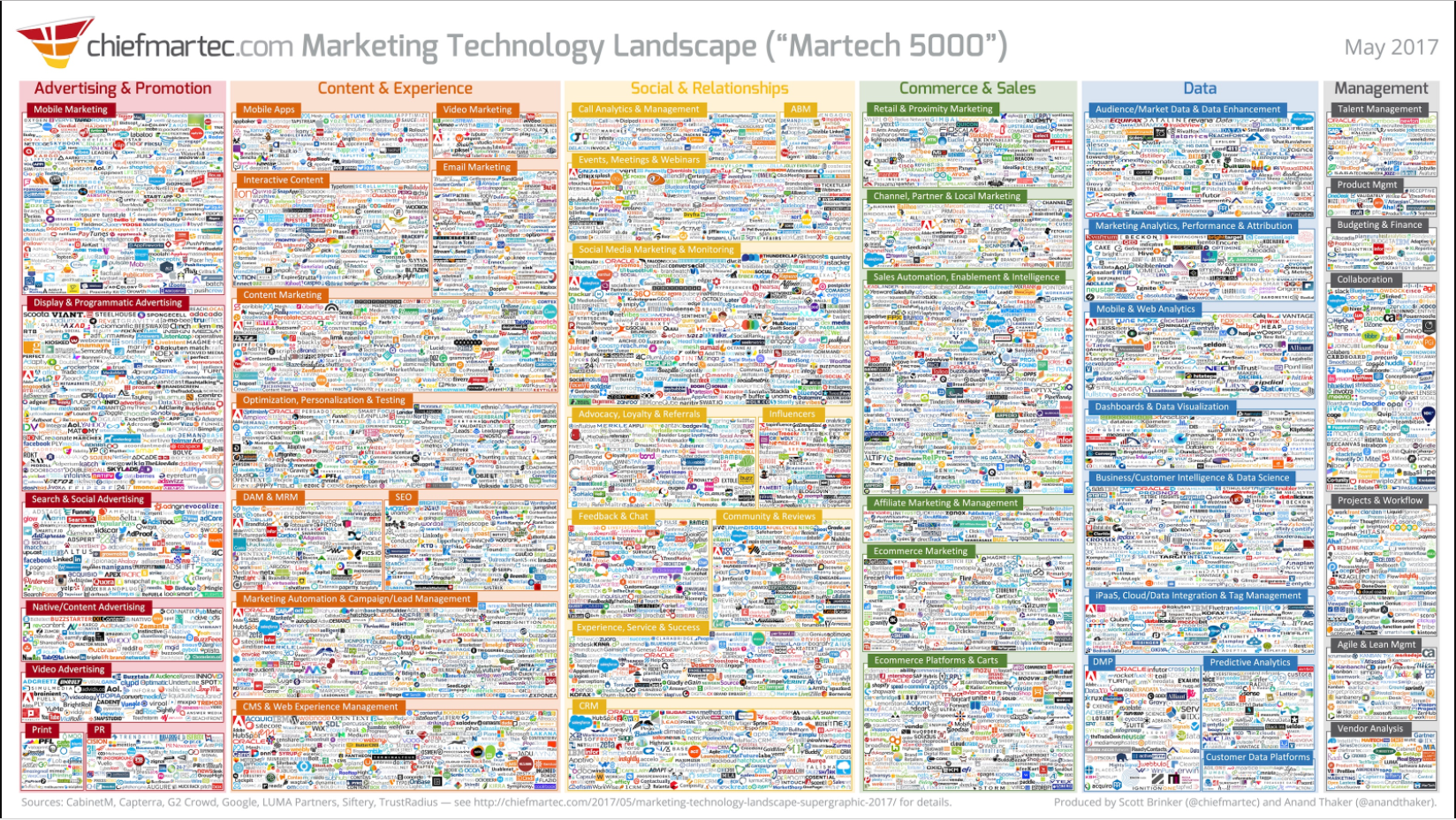Last week Blake and I attended the American Marketing Association's March Academy in Houston where Marketo CMO, Sarah Kennedy, shared with approximately 70 marketers her observations and personal experience with marketing automation and other technologies that enable Sales. The two-hour event consisted of a presentation with audience participation followed by a panel discussion.
Here are the top three takeaways:
1. The Marketing Technology Landscape is Fragmented
With more than 5300 technologies designed to help marketing organizations operate more efficiently and provide better customer experiences, the market is literally overflowing with software - marketers are inundated with data. Kennedy showed a slide of the MarTech stack used at Marketo which consisted of 33 disparate technologies her team of 80 uses to 'get the job done'. The applications ranged in functionality from graphics design, marketing automation, and event management, to project planning, budgeting, ROI tracking and reporting. The biggest challenge for marketers is collating, analyzing and understanding all of the customer engagement data once it's captured.
By show of hands it looked like approximately 70-80% of participants were utilizing some form of marketing automation technology with 2/3 using Marketo. Additionally, the majority of attendees worked in the B2B space, and it seemed that 3/4 of the room were marketers for the oil and gas industry.
The image below gives you an idea of how many available MarTech options exist on the market today categorized broadly by their function.
2. Sales Enablement was a Hot Topic during the Panel Discussion
Several of the questions in the second hour of the event were related to sales enablement and how Marketing and Sales integration has created the ability to close more business. One panelist described how his entire attitude about Marketing shifted when he began getting so much valuable information about his clients due to automation software. He described how he was able to prioritize accounts and sales operations based on customer engagement monitoring and lead scoring. As a VP of Sales, he stressed the importance of regular communication and interaction with the CMO as a game-changer for opportunity identification and how Account-Based Marketing has been invaluable in supporting a complex sales environment.
Sadly, when one of the panelists asked the audience how many attendees had an integrated marketing automation and CRM system in place, only 3 or 4 hands went up. When asked how many people in the audience had regular weekly meetings with the sales team, only one hand remained. It looks like we have some areas of opportunity and improvement in Houston before we can reap the benefits of Sales and Marketing alignment. For many in the audience, change management at the executive level needs to take place so marketers have a seat at the table during strategic discussions.
3. Constructing a Data Model BEFORE Evaluating Technology
When Kennedy asked the panelists, "What do you recommend as best practice for companies when investing in MarTech," their responses were: 1) know your end goal and business reason for buying; and 2) start small with micro-experiments. The warning was clear - companies need to take their time when evaluating software and really understand what business problem they are trying to solve before they begin their assessment. The panelists recommended documenting the data model and flow of information so internal alignment between key stakeholders could be achieved in advance of technology selection.
The advice about micro-experiments followed an observation that many companies bite off more than they can handle which stalls technology implementation and internal adoption. Their suggestion was to select a few pilot projects first before trying to roll out enterprise-wide change. Start small to properly configure the platform, establish the data model, solicit feedback and optimize the results and workflows first.
From my own experience, I couldn't agree more. I've hit many a roadblock in my career trying to sell the entire vision vs. starting on a niche problem that demonstrates value-add in operations. Once you carve out the smaller victories, the organization has tangible results that can't be denied - only improved. We also recommend going through pain of manually tracking information so you can better understand the pitfalls, connections and desired outcomes you are aiming to achieve.
When in doubt, map it out.
Conclusion
Kennedy shared her experience and some of the challenges she faces as a CMO in a rapidly-changing data-dominated environment. It was nice to know that even the CMO of Marketo is human enough to admit that this is a big job - overwhelming at times. To truly take advantage of all the insights data can provide, we need to be fearless in establishing Marketing as a differentiator. She also reminded the audience that Gartner predicts, "By the year 2020, 85% of customer interactions will be managed without a human."
Is your technology and team ready?


